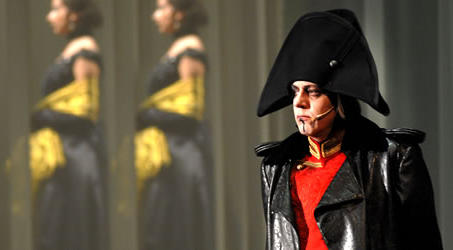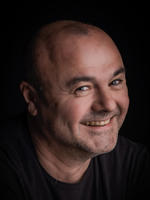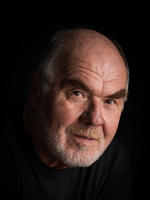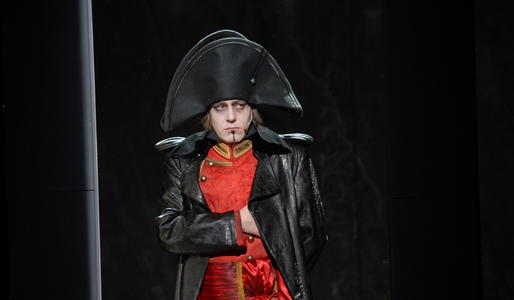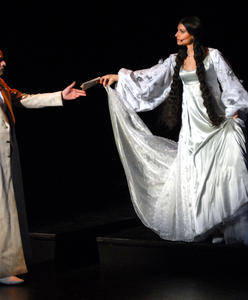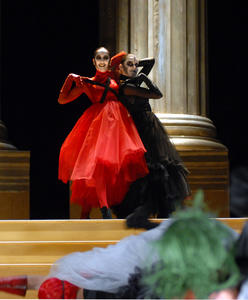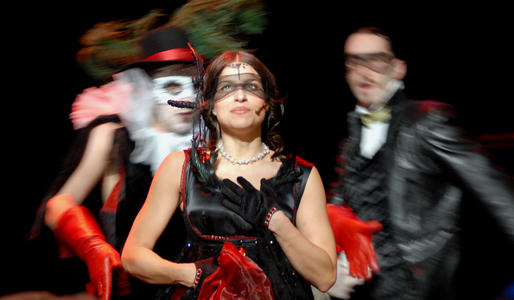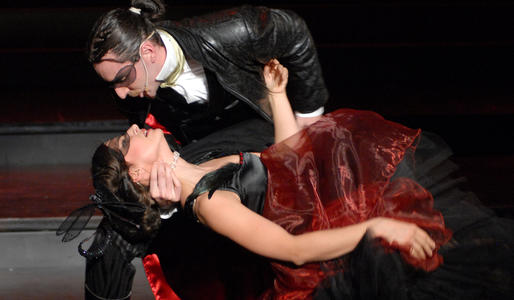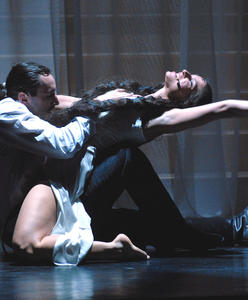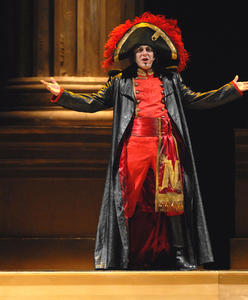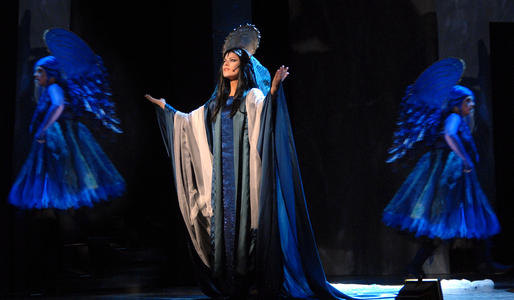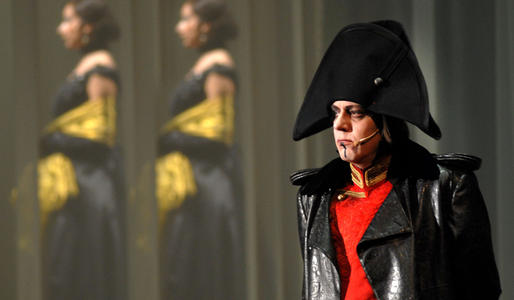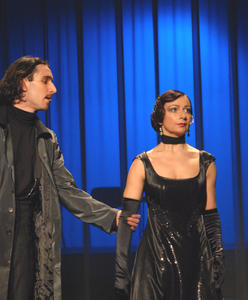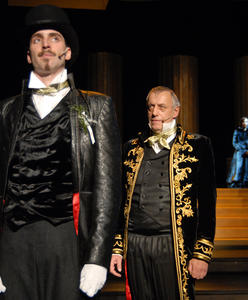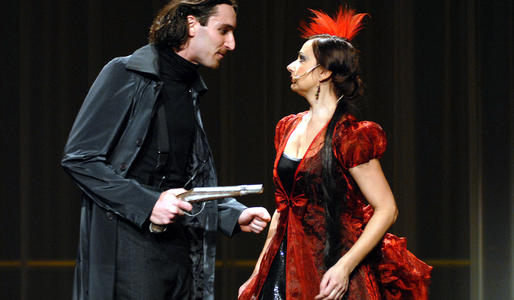The Red and the Black
David Kroča 4. March 2008 zdroj Český rozhlas Vltava
Numerous film adaptations, as well as many secondary literary works, show evidence of the permanent popularity of Stendhal's classic novel. The musical version of the story of an ambitious common man, Julien Sorel, is performed in Brno with the subtitle "post-revolutionary pop opera", by which the authors show that it isn't really a musical.
Milan Uhde squeezed the plot of the extensive two-part novel into a relatively short libretto which leads the main hero through all the important stages of his life that feature in the book within the two-hour performance, clearly and transparently. At the beginning, there is a motivating dialogue with Father Dominic who appeals to Sorel to follow Napoleon's example, then he becomes a lover of the Mayor's wife, and then tries to make a career in a priest's seminary until he both wins and loses in an uneven relationship with a marquis' daughter. When he is leaving for the gallows at the end, he sings paradoxically as if a victor: "I'm calling to you, Death, to take me. / I have a cure for you: the sweet miracle that I had a woman who loved me."
Uhde made his performance more powerful by bringing a series of symbolic and mystical figures onto the stage, for example the Virgin Mary with angels, the philosopher Voltaire or the emperor Napoleon himself. It is the figure of Napoleon, performed by Jan Apolenář with light exaggeration, which is one of the most rewarding elements of the adaptation. As omniscient spectators, we witness the dialogues of the protagonist with Napoleon, while other heroes on the stage can hear only Julien's replies which are reactions to Napoleon's hidden insinuations. Miloš Štědroň's music is as similarly artful as the text; it plays with different musical genres and motifs and never bothers the listener with an insistent melodic theme. Among the mixture of quotations, paraphrases and ironic remarks, the observant spectator can also recognize the melody of the Marseillaise, a revolutionary song which pushes the hero forward to new actions.
Sylva Hanáková's costumes lavishly use the symbolism of colour, which is reflected also in the name of the novel. Black is connected here mainly with the austere frocks of the church representatives and the members of the Jesuit seminary, while red prevails in the suits of Napoleon and his grenadiers because it is the colour of the army in the performance; however, it also symbolizes blood, revolution and unbound passions. The colour contrast is obvious mainly during the ball in which the original choreography of Lenka Dřímalová stands out.
While Milan Horský lags behind as far as his singing performance in the role of Father Dominic is concerned, young Jiří Mach in the demanding role of Julien sings with self-confidence, clearly and with convincing expression. The singing star of the performance which I saw was undoubtedly Jana Musilová as Madame de Renal, who is the right type for the role of Julien’s fateful love. Martin Havelka’s performance is also worth attention, as he has created a distinct and inscrutable figure from the side role of the head of the Jesuit seminary; under the mask of a disciplined dean a secret Bonapartist is hidden.
Milan Uhde and Miloš Štědroň's pop opera The Red and the Black shows the very topical image of a careerist who is climbing up the social ladder, paradoxically, to his own destruction. Even though the performance won’t draw masses of spectators to the theatre, it pushes the borders of Brno musical productions towards the realm of the artistically demanding.
The wings of a butterfly at the start of the play The Red and the Black
Libor Kalina 15. January 2008 zdroj Brněnský Metropolitan
Brno Metropolitan's Gala Evening
Behind everything you will find a woman, as the well-known French saying goes. Almost all world famous novels speak about how women influence the lives of men and also all of society and its politics. And what else should a theatre be about if not about strong stories and real relationships?
But where can such material be found these days, in the age of superficial tabloid newspapers, in an age when relationships and feelings are often considered relative and so much is made subject to materialism.
Theatre creators often cannot do anything but return to history and look for parallels to the living present there or in literature. This is also the case for the play The Red and the Black, staged by Brno's musical theatre ensemble, the world premiere of which took place in December last year and will always remain connected with Brno Metropolitan, which became more than its media partner.
After Stanislav Moša, the director of Brno City Theatre, made an attempt to enter once again into fruitful cooperation with Miloš Štědroň, the playwright Milan Uhde surveyed many of his favourite writers and chose the novel by Henry Beyle-Stendhal The Red and the Black. A new and original play which would follow up the success of their previous musicals, starting from the famous Provázek performance Balada pro banditu –Ballad of a Bandit through Zola’s Nana, performed on the stage of Brno’s Musical Theatre two years ago. “If my health allows it,” Milan Uhde promises, “I am planning to ‘steal’ another French novel, namely Flaubert’s Salambo. At the same time, however, I am also tempted by the Russians,” the successful author pointed out, with modesty so typical of him; other big and tempting topics, connected with great stories. “And it would be hard not to manage to bring at least some of them successfully to the theatre stage!”
Before the premiere, both creators had to face the questions of journalists and other media people, and so it happened that they made a declaration on the present musical theatre scene, which they consider to be the only real people's theatre art in the sense of its closeness to the interests of contemporary audiences. This is in contrast with other theatre forms which keep themselves going giving tribute to the time of their developmental peak, and today mainly offer but a preserved reflection of their more glorious era.
"I believe," says Miloš Štědroň, "that modern theatre today is in the position of the opera in the 18th century, before it started to become 'art' for a minority of the spectators." Just as with opera, it needs a strong and central topic which the present doesn't seem to offer. "Where there is no relationship, there is no story," claims the playwright Milan Uhde, and he adds: "Friendship and relationships are withering away. Generally, they are getting the stuffing knocked out of them."
Like today, a few years after the French revolution social and political popularity was gained by many people who in most cases did not make a success of their time in the positions they obtained. The "rotation of personnel" is these days also considered to be a logical process; we perceive it as a natural method of selecting leaders. However, the 19th century also differed from the present, despite many analogies. Among other facts is the main reason that a person couldn't usually become a socially important figure overnight, thanks to only one clever or lucky choice. He had to fulfil many binding social conditions. Despite this, history knows many "jumpers" who managed to climb the rungs of the social ladder by leaping two or even four at the same time. Constantly upwards and upwards, up until the bitter fall - you can follow the story of Julien Sorel thanks to the above-mentioned creative talents, to whom at least the director Juraj Deák needs to be added, as well as the actors and musicians, of course. We can also think about whether the absurdity of the hero's choice between a promising career and a fateful relationship is unlikely only in today's context or also in the context of that time. The theatre performance itself, an exceptional thing, which the very first performance (in the world) of this work undoubtedly is, shared the favour of the celebrating audience at Brno Metropolitan's gala evening with other events. Before the curtain rose on the premiere, the hetman of the South Moravian region, Stanislav Juránek, the director of the South Moravian management agency, Magda Slaninová, the actor Petr Gazdík, and the actress and benefactress Jitka Čvančarová all appeared on stage, along with the chairwoman of the DebRA ČR association, Magda Hrudková, who symbolically accepted a cheque for 25 000 CZK from the sponsors of the evening for the support of people who suffer from epidermolysis bullosa (EB) disease. The foundation helps to solve the problems of people whose delicate skin is thin and vulnerable like the wings of a butterfly, which is also the symbol of the charity. After that, the stage was left to the actors. After the dramatization of events from nineteenth century France had finished, it was the turn of contemporary stories which filled the foyer of the new Brno musical theatre building, enjoyed together with choice delicacies and excellent south Moravian wine.
A musical about careers, love and death
Vít Závodský 14. January 2008 zdroj Týdeník Rozhlas
Not long after their successful home-town performance of the American musical Fame, Brno City Theatre staged the musical premiere of an original "post-revolutionary pop-opera", The Red and the Black, by Milan Uhde and the composer Miloš Štědroň. Yet another of the fruit of their cooperation (which has resulted in Balada pro banditu - Ballad of a Bandit, Pohádka máje - May Fairy Tale, and Zola's Nana which was staged not a long time ago at Brno City Theatre), it is based on Stendhal's famous novel of the same name from the year 1830.With the alternation of many key figures, Juraj Deák became the guest director. Uhde's quality libretto reduces the four-hundred-page work of prose to a kind of digest: in it, he primarily stresses the powerful story of a plebeian young man, viewed mainly from a viewpoint of romantic individual emotionality rather than Stendhal's typical social criticism. An inventive textual and stage innovation is the projection of the inner worlds and motives of the heroes onto the stage in the form of visible additional characteristic figures which take part in the action continuously, functioning as some kind of "guru" to the main protagonists.
The manly and predatorial Julien Sorel, played by Dušan Vitázek (alternating with Jiří Mach), finds a model immediately in the ambitious arriviste Napoleon (the excellent Jan Apolenář) and his grenadiers, while getting to know the pragmatic backstage practices of the Jesuits, lead by their local Superior, Martin Havelka. For the honourable Madame de Renal (Ivana Vaňková), the Virgin Mary (Hana Holišová) is such a "guru", with a choir of angels. Mathilda de la Mole (Soňa Jányová), who struggles for dominance in her love life, is "assisted" by the philosopher Voltaire (Viktor Skála). Štědroň's score, stylishly divergent, is certainly imaginative under the direction of the experienced conductor Jiří Petrdlík, at least as far as various allusions and paraphrases are concerned, though in comparison with Nana it lacks easy-to-remember "hit" melodies. With Sylva Hanáková's mainly two-tone costumes, David Bazik's fully kinetic setting and Lenka Dřímalová's choreography, recognition comes late that the real meaning of life is not found in climbing the career ladder but in true reciprocated love.
How Uhde and Štědroň conquered Stendhal…
Luboš Mareček 14. December 2007 zdroj MF Dnes
Neither the librettist Uhde nor other members of the production team are afraid of great gestures, emotions and breathtaking pace. The director Juraj Deák has spiced up the bombastic Štědroň's prelude with fast-moving projections in which guns shoot, blood is shed and hands are washed, Pilate - style.
Not all kinds of audience will like this and the result can be labelled as extreme from this point of view. The speed with which the story tumbles forwards, even as it twists and turns, may prevent some people from getting close to the heroes and experiencing their stories. However, it is a fact that a certain level of histrionics is automatically expected of musicals, and it goes well with this romantic matter. Even Štědroň himself calls his work (definitely not only as an excuse) a post-revolutionary pop opera. And the musical has a lot in common with theatre pop.
There is no need to meditate about the genre but it is important to speak about the result. Deák's production is full of energy but its sentimental spots are also exposed. At the end, the director opens up the insides of the stage into which the tragic plot collapses.
The director doesn't bombard the audience with exaggerated effects, but skilfully narrates the story of a stubborn boy who experiences the love of his life just before going to the gallows. It doesn't really matter that in this current pragmatic period people are really scared of similarly romantic gestures and call them unconvincing.
Dušan Vitázek tackled the main role excellently and his unremitting vehemence while playing and singing suits Sorel very well. Ivana Vaňková as Madame de Renal plays the fatally devoted lover without kitsch-like effusiveness. The new musical The Red and the Black is a pleasant piece of work which is, despite the excess of flaming emotions on show, not afraid to pass on the message that we don't have enough of feelings and emotions these days.

